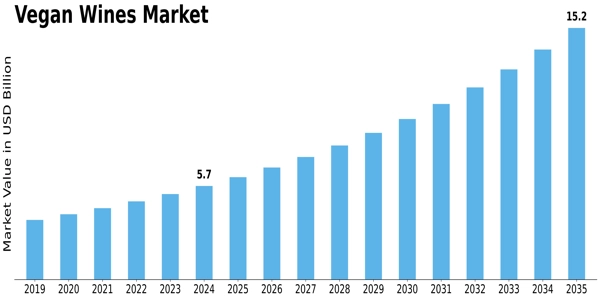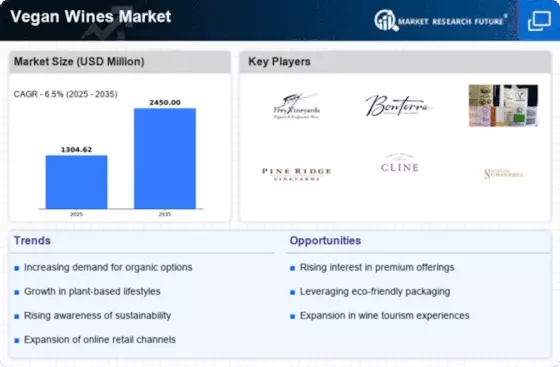Europe Vegan Wines Size
Europe Vegan Wines Market Growth Projections and Opportunities
The European vegan wines market is influenced by several key market factors that shape its growth, trends, and consumer demand. One significant factor is the increasing adoption of plant-based lifestyles and ethical consumerism across Europe. As more people embrace veganism and seek out products that align with their values, there's a growing demand for wines that are free from animal-derived ingredients and production processes. Vegan wines, which are made without the use of animal-derived fining agents such as gelatin, egg whites, or fish bladder, cater to this expanding market segment of conscious consumers.
Changing dietary preferences and health consciousness also play a crucial role in driving the European vegan wines market. Consumers are becoming more mindful of what they consume, opting for healthier and more natural products. Vegan wines, which are often perceived as being more natural and less processed than their conventional counterparts, appeal to health-conscious individuals seeking cleaner and purer beverage options. Moreover, the perception that vegan wines may cause fewer allergic reactions or adverse health effects further contributes to their popularity among consumers with dietary restrictions or sensitivities.
The influence of marketing and branding strategies is another significant market factor in the European vegan wines industry. Companies leverage creative marketing campaigns to differentiate their vegan wine offerings and communicate their ethical and sustainable values to consumers. Labels and certifications indicating that wines are vegan-friendly help consumers identify and choose products that align with their preferences and values. Additionally, storytelling and brand narratives highlighting the winery's commitment to environmental sustainability and animal welfare resonate with conscious consumers, driving brand loyalty and consumer trust.
Distribution channels play a critical role in shaping the European vegan wines market, impacting accessibility and consumer reach. While vegan wines were once primarily available through niche retailers and specialty stores, they are now becoming more mainstream, with supermarkets, online retailers, and wine clubs expanding their selection of vegan-friendly wines. This wider distribution network ensures that vegan wines are accessible to a broader audience of consumers across Europe, driving market growth and increasing consumer awareness of vegan wine options.
Government regulations and labeling requirements also influence the European vegan wines market. In recent years, there has been a push for greater transparency and disclosure in the wine industry, prompting regulatory bodies to introduce stricter labeling standards regarding the use of animal-derived fining agents. Wine producers are required to accurately label their products to inform consumers about the presence or absence of animal-derived ingredients, helping vegans and vegetarians make informed purchasing decisions. Compliance with these regulations is essential for wineries to maintain consumer trust and credibility in the growing vegan wines market.
Competitive dynamics and market trends shape the European vegan wines market, driving innovation and product differentiation among wine producers. With an increasing number of wineries recognizing the demand for vegan-friendly options, competition in the market has intensified. Wineries differentiate themselves by offering a diverse range of vegan wines, including reds, whites, rosés, and sparkling wines, catering to varying consumer preferences and occasions. Innovation in production techniques and packaging formats further contribute to product differentiation and market competitiveness.
Consumer behavior and preferences also play a pivotal role in driving the European vegan wines market. While some consumers prioritize taste, quality, and price when choosing wines, others place greater importance on ethical considerations, sustainability, and environmental impact. Understanding consumer preferences and market trends is essential for wineries to develop and market vegan wines that resonate with their target audience. Consumer education and awareness campaigns highlighting the benefits of vegan wines, such as sustainability, cruelty-free production, and health benefits, help expand the market and attract new consumers to the segment








Leave a Comment